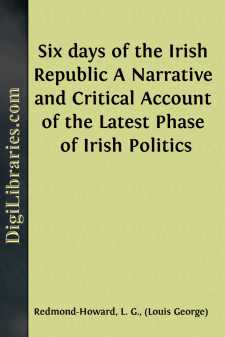Categories
- Antiques & Collectibles 13
- Architecture 36
- Art 48
- Bibles 22
- Biography & Autobiography 813
- Body, Mind & Spirit 142
- Business & Economics 28
- Children's Books 14
- Children's Fiction 11
- Computers 4
- Cooking 94
- Crafts & Hobbies 4
- Drama 346
- Education 46
- Family & Relationships 57
- Fiction 11829
- Games 19
- Gardening 17
- Health & Fitness 34
- History 1377
- House & Home 1
- Humor 147
- Juvenile Fiction 1873
- Juvenile Nonfiction 202
- Language Arts & Disciplines 88
- Law 16
- Literary Collections 686
- Literary Criticism 179
- Mathematics 13
- Medical 41
- Music 40
- Nature 179
- Non-Classifiable 1768
- Performing Arts 7
- Periodicals 1453
- Philosophy 64
- Photography 2
- Poetry 896
- Political Science 203
- Psychology 42
- Reference 154
- Religion 513
- Science 126
- Self-Help 84
- Social Science 81
- Sports & Recreation 34
- Study Aids 3
- Technology & Engineering 59
- Transportation 23
- Travel 463
- True Crime 29
Six days of the Irish Republic A Narrative and Critical Account of the Latest Phase of Irish Politics
Description:
Excerpt
CHAPTER THE FIRST
A BOLT FROM THE BLUE
Those who were in Dublin on Easter Monday 1916 were privileged to witness a scene which for dramatic setting and for paradoxical conception is certainly the most extraordinary of any of the long line of rebellions in Irish history, for at a time when it seemed almost universally admitted that "Separatism" was from an economic, racial, and military point of view utterly impossible, there suddenly arose without warning, without apparent reason, and as if from nowhere, a body of men, fully armed and completely organized, who within the space of a single hour had captured every strategic point in the capital, and to its utter amazement held it up in the name of a new "Republic," in much the same way as a highwayman of old used to hold up coaches on Hounslow Heath.
It was in very deed a bolt from the blue. The first intimation that the general public got of the rising was the sudden spread of the wildest rumours—"Dublin Castle has just been taken by the Irish Volunteers," "The Post Office has been captured by the Sinn Feiners," "Soldiers and police are being shot at sight," "Larkin's Citizen Army are firing on women and children," but, for the most part, these rumours were discredited as impossible, at most being put down as some accidental clash between military and civilians, and it was only as people rushed into the street and heard the stories of the encounters first-hand that they began to realize that anything unusual was taking place.
Bodies of armed men had indeed been remarked in unusually large numbers in the streets all the morning, increasing and concentrating towards twelve, but everyone had grown so accustomed to these demonstrations for the past three years, since they had been inaugurated in Ulster by Sir Edward Carson, that nobody had taken any particular notice.
People merely remarked that it was rather strange, in view of the abandonment of the "Easter manœuvres" which had been organized for Sunday, and which had been cancelled at the last moment, late on Saturday night, by special order of Professor Eoin MacNeill, editor of the Irish Volunteer, which ran: "Owing to the very critical position, all orders given to Irish Volunteers for to-morrow, Easter Sunday, are hereby rescinded, and no parades, marches, or other movements of Irish Volunteers will take place. Each individual Volunteer will obey this order strictly in every particular."
It was supposed, therefore, that the numbers were due to the new recruits which had been the outcome of the protest against the deportation of the Sinn Fein leaders some time previous to this, and moderate people hoped that the Sinn Fein authorities were about to show the same discretion in the matter of an armed demonstration in Dublin which the authorities had shown in the matter of the proposed inclusion of the military in the St. Patrick's Day parade in Cork.
Possibly they may have had secret information—for they had their spies in every department—that the long-meditated disarmament had been determined upon, and immediately decided to anticipate the offensive by a strong defensive of their own choosing. At any rate, Monday found them fully prepared, each in his proper place.
Accordingly, on the exact stroke of midday the Volunteers in Sackville Street were suddenly seen to stop short opposite the Post Office. "I was outside the building at the time," said an eye-witness of that now historic event, Mr. E. A. Stoker, the well-known Grafton Street jeweller, "and noticed a mixed crowd of, I should say, roughly, about one hundred men and boys, all armed, and half the number carrying old portmanteaux and parcels of every description. It is said that Connolly was leading.
"He called, 'Halt! Left turn! Come on.' The crowd then ran into the Post Office. I also followed. Several men crossed the counter and held revolvers at the officials' heads.
"One youth, intensely pale and nervous, put a revolver at my breast and said, 'Clear out.'
"I replied, 'What's up?'
"He said, 'Hands up, or I'll blow your heart out.'
"Up went my hands, and he backed me out to the entrance, and within five minutes everyone else had been bundled out in the same unceremonious way, and they were in possession."
Once in possession of the Post Office—which from its position and character was admirably suited for a general headquarters—the next thing was to fortify the place, for there was no knowing what had happened to the other enterprises which had been timed to take place simultaneously, or when the authorities would send out an armed force for its recapture....


